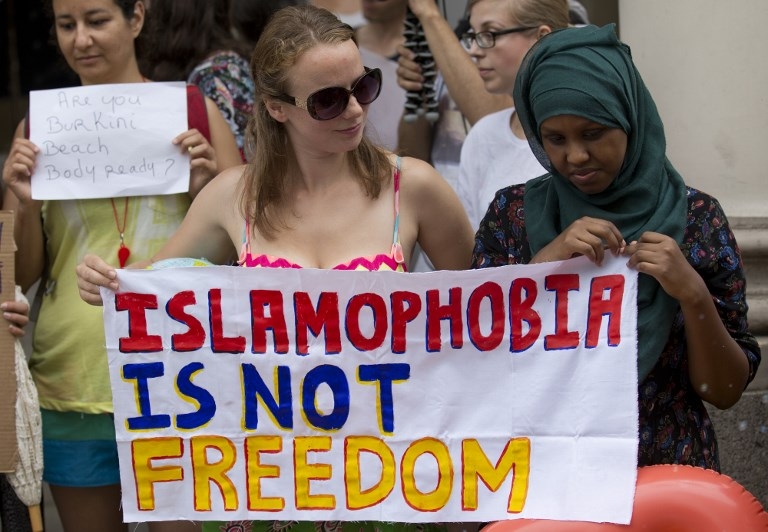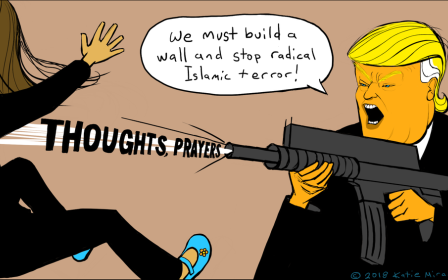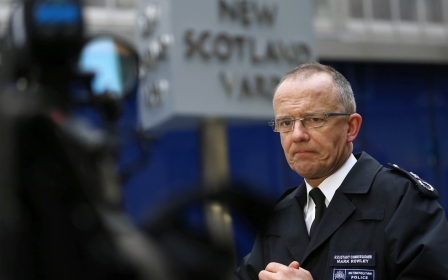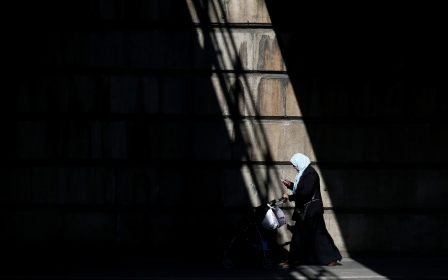Islamophobia without borders: The case of Brigitte Gabriel

"I am the Anne Frank who lived to tell about it, and I'm trying to warn the world."
These rather intense words were spoken not by a survivor of the Holocaust but by Brigitte Gabriel, a well-known Lebanese-American Islamophobe and self-styled "national security expert" who in 2017 discussed her "childhood under brutal terrorism" with US talk-show host Dave Rubin.
The author of such predictable (and bestselling) titles as Because They Hate: A Survivor of Islamic Terror Warns America and They Must Be Stopped: Why We Must Defeat Radical Islam and How We Can Do It, Gabriel is the founder of the ACT for America organisation, which specialises in the profitable dissemination of anti-Muslim propaganda (see, for example, this advisory: "If you live in a warm state such as Florida or Arizona and see someone dressed in an overcoat or unusual clothing for the season and the location, they may be hiding or packing explosives or a suicide belt").
An era of intensified bigotry
But while Gabriel's tale of personal victimisation by "Islamic terror" may be an easy sell in a post-9/11 era of intensified bigotry - particularly given apparent Trumpian efforts to Make Fascism Great Again - her version of history isn't exactly reconcilable with reality.
As Gabriel tells it, she was born in the "once peaceful, idyllic Christian town" of Marjayoun in southern Lebanon - a country whose capital, Beirut, was "commonly called the Paris of the Middle East". A lengthy Buzzfeed report by journalist David Noriega points out that Gabriel was in fact born Hanan Qahwaji, but perhaps this name was too Middle East and not enough Paris.
Jihad-centric terminology is an effective marketing tool when dealing with Western audiences trained in the sensationally reductionist rhetoric of the War on Terror
According to Gabriel's 2017 interview with Rubin, her charmed childhood came to an end at the age of 10 in 1975 when "radical Islamists blew up my home ... burying me under the rubble, wounded". During her subsequent spell in hospital, she says, her father gave her the rundown on the context for their plight: "Because we are Christians, the Muslims consider us infidels and they want to kill us."
That was at the start of the Lebanese civil war, a 15-year affair with complex political and socio-economic causes that Gabriel has taken the liberty of boiling down to a "religious war" launched by radical Muslims and Palestinians against peace-loving Lebanese Christians.
She informs Rubin that, "once the call of jihad was declared" in Lebanon, "all the Muslims went with the Palestinians" - an analysis that leaves little room for Palestinian Christians, Palestinian leftists, Lebanese leftists, wars by Lebanese Shia Muslims against Palestinians, and about a billion other details.
But hey, jihad-centric terminology is an effective marketing tool when dealing with Western audiences trained in the sensationally reductionist rhetoric of the War on Terror.
Backing Israel's mass slaughter
Other intriguing components of Gabriel's Rubin testimony include the claim that she lived in a bomb shelter in Marjayoun from age 10 to 17, subsisting on dandelions and grass - a unique lifestyle choice, no doubt, given that even during the civil war, fighting was far from continuous, and no other Lebanese has ever been known to spend seven years in a bomb shelter.
Mercifully, the "childhood under brutal terrorism" gradually drew to a close, thanks in no small part to the Israeli invasion of Lebanon in 1982 - through which, Gabriel tells us, Israel endeavoured to "help the [Lebanese] Christians take back their democracy [and] re-establish control of the country".
She refrains from addressing what the function of a Christian "democracy" might be in a Muslim-majority country, or the fact that Israel's noble invasion entailed the slaughter of some 20,000 people in Lebanon, the vast majority of them civilians. In September 1982, Israeli forces backed a massacre of up to several thousand people in the Beirut Palestinian refugee camps of Sabra and Shatila by Israel's right-wing Lebanese Christian Phalangist allies.
Ever more interesting for our modern-day Christian Anne Frank, the founder of the Lebanese Christian Phalangists got the idea for his party from none other than the Nazis. But why waste time contemplating reality when there are Muslims to vanquish?
Anti-immigrant vitriol
Enamoured of the state of Israel, Gabriel elected to live there from 1984 until 1989 - an option obviously unavailable to Palestinian refugees who actually hail from the land in question - after which she relocated to the United States, where she and ACT for America continue to agitate on behalf of "our ally Israel ... a remarkable oasis of civilisation".
Nor has Gabriel's own migratory trajectory interfered in the least with her dogged propagation of anti-immigrant vitriol and tweets in favour of border walls. The ACT for America website warns visitors that "Refugee Resettlement is a serious problem, just look at Europe".
All of this might be somewhat laughable if Gabriel and her organisation didn't boast a substantial public following, made all the more worrying by her access to corridors of power.
In March 2017, for example, she turned up at the White House, prompting the Guardian to report: "The leader of an organisation widely identified as an anti-Muslim hate group visited the White House on Tuesday and described her visit as 'very productive'."
Stereotyping Muslims
And in March 2018, a Vox article detailed the "deep and extensive ties" maintained by US President Donald Trump's latest high-level appointees, John Bolton and Mike Pompeo, to "an organised group of anti-Muslim writers and activists" including Gabriel.
As is the case with other wildly successful immigrant Islamophobes, such as Ayaan Hirsi Ali, Gabriel's perceived authority stems from her first-hand experience with the alleged horrors of Islam.
The simplicity of her message is also easily digested by Western masses in search of a convenient domestic and global scapegoat.
In her book Because They Hate, Gabriel contends that "in the Muslim world, extreme is mainstream"; in other words, good luck finding a Muslim who isn't a budding terrorist (and don't forget to alert the authorities to anyone wearing long sleeves in Arizona).
In the age of ubiquitous borders, Islamophobia unfortunately knows none.
- Belen Fernandez is the author of The Imperial Messenger: Thomas Friedman at Work, published by Verso. She is a contributing editor at Jacobin magazine.
The views expressed in this article belong to the author and do not necessarily reflect the editorial policy of Middle East Eye.
Photo: Protesters hold a sign reading “Islamophobia is not freedom” outside the French Embassy in London on 25 August 2016 to demonstrate against the ban on burkinis on French beaches and to show solidarity with Muslim women (AFP)
New MEE newsletter: Jerusalem Dispatch
Sign up to get the latest insights and analysis on Israel-Palestine, alongside Turkey Unpacked and other MEE newsletters
Middle East Eye delivers independent and unrivalled coverage and analysis of the Middle East, North Africa and beyond. To learn more about republishing this content and the associated fees, please fill out this form. More about MEE can be found here.






